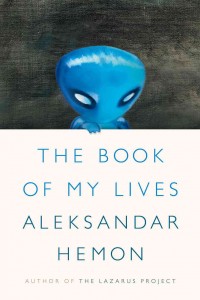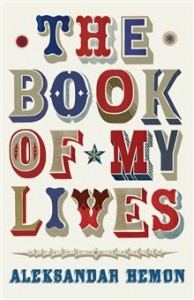
First of all, I did not actually get the same book. From March to September, the book has been re-launched in an edition from Picador (London), the first being from Farrar, Straus and Giroux (New York). And, indeed, the two editions look and feel different. The cover of the first edition contained, as Hemon confirmed at the Berlin talk, a possible depiction of “Mingus”, an imaginary alien brother that his daughter had invented while her younger sibling was diagnosed with a rare brain tumor. In a very lucid yet dramatic piece of prose, “The Aquarium,” Hemon explains that this was his daughter’s way to digest her sister’s sickness and death, a way of processing experience by externalizing it, and thus completing the many words she was picking up with experiential content. But what is more remarkable about this story is that Hemon recognizes in the Mingus phenomenon something related to his own life: “I recognized in a humbling flash that she was doing exactly what I’d been doing as a writer all these years: in my books, fictional characters allowed me to understand what was hard for me to understand” (205).

Unlike the American cover, which retains something very important and intimate to the book, the Picador cover looks, to me, more general, perhaps a bit pop-like. At some point, the host of the evening in Berlin, Bernhard Robben, asked Hemon about the Mingus story and reached for the book with the intention to show the cover. “Do you have the original?… No, that’s not the original”, Robben said and put it back on the table. I am running the risk here of assuming too much, but to me it seemed that one could hear in Robben’s voice a slight note of regret when he referred to the original cover, which was not there anymore.
Compare also the different phrasing of the announcement on the web-site of McNally Jackson with the text on the official web-page of the Festival. Here is an abstract from the first one: “In his first nonfiction work, Hemon tries to restore the memories of his youth and follow the threads that link his Bosnian past with his American present … a necessary book by one of our most important writers.” And here is one from the second: “Aleksandar Hemon is often compared to Vladimir Nabokov because he writes powerful stories about cultural identity and homelessness; about people from Eastern Europe who try to become American in a way that is simultaneously moving and bitterly funny.” What a coincidence, the verb “try”! At least on the surface, it looks like the first text speaks of Hemon as of an “important writer” having an “American present”, who is trying to restore his (European) past, while the second presupposes that Hemon writes about trying to be American (i.e. still being European), also placing him next to Nabokov, a great writer indeed, but with a similar in-between status vis-a-vis English-language and American literature.
[hupso_hide]
And while it is true that in both cases the discussion touched upon facets of this problematic yet privileged status, especially the linguistic experience and the lives within different countries and languages, the discussion in New York seemed more critical (whatever impression you get from the announcement), for the reason that it dwelled for some time on the notion of immigrant fiction. Compared to the bookstore launch, the Festival seemed, as the notion of festival itself presupposes, a rather celebratory exercise, followed by the reading of the original and reading of the translation into German (by Matthias Fienbork). Hemon himself was in a playful mood, speaking in jokes.
Ultimately, whatever the status and the ways to conceptualize it, what makes Hemon special is his mode of reflecting past experience and the trials of uprootedness. Often this means oscillating between dramatic, metaphysically charged reliving of the past and biting (self-)irony. Perhaps the simple fact that Hemon is a very puzzling writer is a better explanation for why someone would go to the same book launch twice, on two different continents. Or is it perhaps this: in order to understand a book about lives, one has to also experience it in his own different lives?
